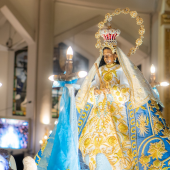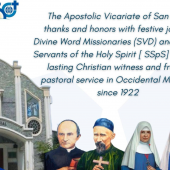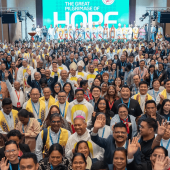Mission Inter Gentes and Its Implication for Mission Theology today
During the Second National Mission Congress (April 17–20, 2022), a series of mission-related presentations was scheduled as the final activity for the Jubilee Year commemorating 500 years of Christianity in the Philippines, Asia's major Catholic country.
Father Samuel N. Agcaracar, currently teaching at Divine Word Seminary and the Divine Word Institute of Mission Studies in Tagaytay City, examined the consequences of the most recent Apostolic Constitution, Praedicate Evangelium, (Preach the Gospel) on the Church as a missionary church.
According to Father Agcaracar, Pope Francis' choice to place a premium on synodality as part of his ecclesiological reform reflects his vision of a missionary Church.
The priest said that this document, released on March 19, 2022, embodies this change for a colonial church that genuinely reflects her missionary origins as a pilgrim church, as expressed by Ad gentes (to the nations).
Father Agcaracar believes that such a perspective has consequences for missionary work and theology in an increasingly heterogeneous society.
The presentations at this symposium covered three distinct topics: first, communio (communion) ecclesiology (study on church) as the fulcrum of mission theology since the Second Vatican Council; second, the concept and development of Missio Inter Gentes; and third, some implications of Missio Inter Gentes for mission theology today.
With these points in mind, the Filipino missiologist centered his presentation on the following question: "How should the church carry out its mission in a world where there are so many different ideas and cultures?"
He regards communio ecclesiology as the pivot around which mission theology is built. It emphasizes three different communion ideas: the center of the Church's self-understanding, a collegial rather than monarchical institutional structure, and a theological concept.
He observes, quoting the Congregation for the Doctrine of the Faith (CDF), “Communion (koinonia) is an excellent metaphor for conveying the heart of the Church's mystery and can undoubtedly be a key to the rebirth of Catholic ecclesiology.”
Because the Church is a Communion, this is a critical work that allows for theological reflection on the Church's mystery, which, as Father Agcaracar put it, "is always inviting new and deeper inquiry."
While he maintains that the Church's status as a communion presupposes a collegial rather than a monarchical organizational structure, it is a communion of local churches, representing Christ's Body in its particular geographical region.
As a fresh theological concept, Communion is rooted in ecclesial connection and refers to the bond between man and God established in Christ and communicated via the sacraments.
His second point of emphasis was on the concept and development of Missio Inter Gentes. He demonstrated substantial adjustments from missio ad gentes (mission to the nations) to missio inter gentes (mission among the nations).
He asserts that "Ad Gentes has been inextricably linked to Eurocentric prejudice for long years."
This missionary method, directed toward the people, carries colonial, institutional, and superiority overtones. Its ultimate goal is to establish the Church.
"The method is geared toward conversion through linguistic, cultural, and social traditions." "A mission is a one-way street," Father Agcaracar explained.
He agrees that, notwithstanding Ad Gentes' ambiguous significance, its contribution to forming the inter-gentes paradigm cannot be overlooked.
According to him, Missio Inter Gentes is renowned for its non-confrontational, dialogical approach to societies with varied cultures, faiths, histories, and customs.
"It is pertinent to the difficult task of carrying out Christian ministry in a varied and pluralistic world," he explained.
According to M. D. Thomas, an Indian theologian, "Missio Inter Gentes" implies the "mission" of the people, for the people, with the people, from the people, and among the people.
Furthermore, he stated, "a task is not fulfilled by a single individual or a small group of persons, but by all the elements of a certain grouping, together." The beneficiaries of the mission are fully involved in the mission's execution.
He expanded on this concept further in the Asian setting, where the Federation of Asian Bishops’ Conferences (FABC) has not utilized the phrase "missio inter gentes" to characterize its mission strategy. "Missio inter gentes," it is argued, best symbolizes what the FABC aspires to accomplish.
The final point of his talk was to tackle the issue of the implications of Missio Inter Gentes for mission theology today.
He says that Mission Inter Gentes could show its relevance in light of the Second Vatican Council's Communion Theology by having a reinvigorated catholicity, contextualized theology, and intercultural theology, among other things.
With societies becoming multicultural, such openness to cultural diversity is a missiological imperative.
He said the concept of "renewed catholicity" is a point for resourcement in the Church today.
The priest claims that "it is a catholicity that provides a rich and promising ground for communion in the Church."
"Catholicity crosses all boundaries and embraces differences that divide the faithful and all of humanity, whether based on their beliefs or how much money each person has," he said.
According to Father Agcaracar, "Mission Inter Gentes" in contextual theology means a call for dialectic between the Scriptures and contexts of social and cultural change and between the local and the universal norm of the Gospel.
He believes that the basis of such criticism is that the Gospel of Jesus Christ is multifaceted and has a much richer meaning than we can perceive from our limited historical and cultural perspectives.
Finally, Missio Inter Gentes in the context of intercultural theology is due to the continuing impact of migration and technological revolutions.
If this happens, it can lead to cultural conflict because people are ethnocentric and do not handle diversity well, the priest said.
He described it as an expression of the Church's new openness and theologies.
Its "bridging potential" thus establishes its relevance both in a traditionally multicultural society and in today's fast-growing multicultural and global world. Inculturation, then head of the Congregation for the Doctrine of the Faith, said we should no longer speak of inculturation but interculturality.
Intercultural theology does not begin from above or from the center but below and from the periphery, moving towards the center.
So, when the Church talks about how to do a Christian mission, it does not start with abstract and universalistic theological ideas and concepts but with the life experiences and other challenges that arise from the ongoing encounter with contemporary realities and specific contexts.
He believes that intercultural theology nurtures the ability to look at oneself through the eyes of others, a missionary imperative in today's globalized and multicultural world.
“Amid the growing polarization, the Church is called to discover the dignity of difference. This dignity of difference lies in our recognition of the dignity of the other person who is different from us and our awareness that in such ‘otherness,’ we can encounter the mystery of God,” he concluded.
Radio Veritas Asia (RVA), a media platform of the Catholic Church, aims to share Christ. RVA started in 1969 as a continental Catholic radio station to serve Asian countries in their respective local language, thus earning the tag “the Voice of Asian Christianity.” Responding to the emerging context, RVA embraced media platforms to connect with the global Asian audience via its 21 language websites and various social media platforms.

















- Reply
Permalink